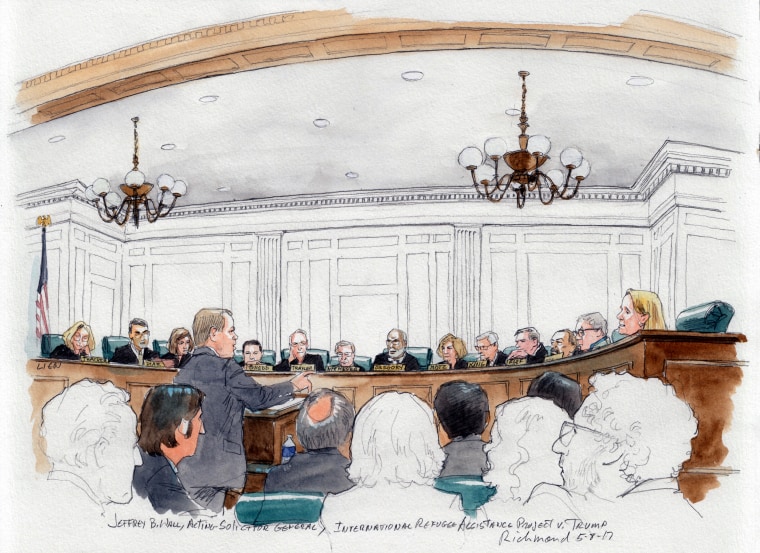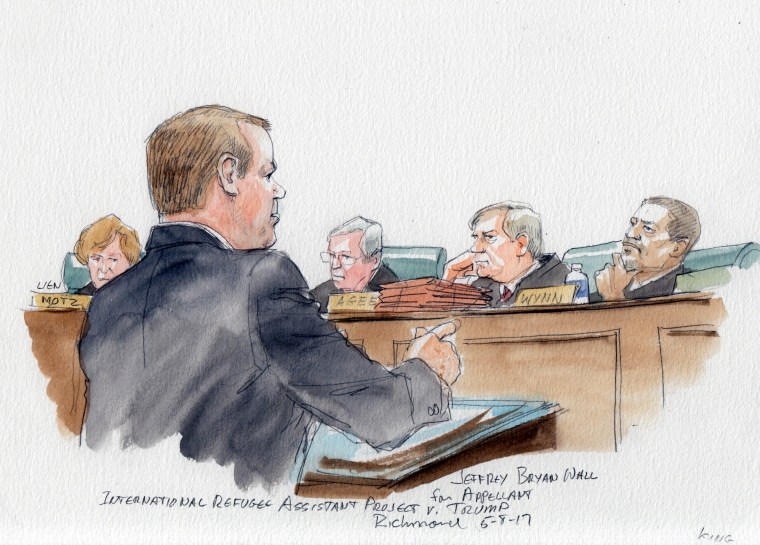A majority of the judges on a federal appeals court seemed skeptical of the government's defense for President Donald Trump's executive order restricting travel, during courtroom arguments Monday.
The Justice Department urged the Fourth Circuit Court of Appeals in Richmond to lift a stay imposed by a Maryland federal judge March 16th blocking the administration from carrying out the executive order.
Thirteen members of the appeals court heard the case, bypassing the normal first step of a hearing before a three-judge panel of the court.
Related: 17 Attorneys General Say Trump Travel Ban Harms Universities, Medical Institutions, Tourism
Jeffrey Wall, the acting solicitor general, representing the Trump administration, argued that the executive order had a legitimate national security purpose, allowing the government to assess the reliability of background information on visa applicants from six countries associated with terrorism.

"We're not sure those governments are giving us good enough information. We want a 90-day pause, just while we check the procedures and make sure it's enough," Wall said.
Candidate Trump's campaign-trail calls for a "total and complete shutdown" on Muslim immigration were at the core of the two-hour argument.
Omar Jadwat of the ACLU said Trump's words prove that the executive order was based on an anti-Muslim bias.
"Even the intelligence agency in the Department of Homeland Security said the order would not reduce terrorism," he said.
Related: DHS Draft Report Casts Doubt on Extra Threat From ‘Travel Ban’ Nationals in U.S.
But Wall countered that the campaign rhetoric is irrelevant because all that matters is what the president said and did after he took the oath of office. That contention was challenged by several members of the court Monday.
"Has the president ever repudiated the campaign statements he made about a Muslim ban?" asked Judge Robert King.
After the first executive order was blocked in court and the president signed the second one, "Sean Spicer said all the principles remain the same," said Judge Henry Floyd, referring to the White House spokesman.
King said the government and the challengers, with their opposite views of the importance of Trump's campaign statements, "are like ships in the night. That's the most important issue in the whole case."

But the court's more conservative judges pressed Jadwat to say how long the taint of the campaign statements would last.
"I don't know where it ends," said Judge Paul Niemeyer. "There has to be some deference" to the president's decisions about national security, he added.
Replied Jadwat, "It's not where it ends, but where it begins in the first place."
He even said the same executive order would be valid if it had been imposed by a different president who never made any anti-Muslim statements.
President Trump's original travel order, issued seven days after the inauguration, was blocked by court rulings. Enforcement of the revised order — imposing a 90-day ban on travel from Iran, Sudan, Syria, Libya, Somalia, and Yemen, but not Iraq — was to take effect March 16. It was also barred by a federal judge in Hawaii. The Ninth Circuit Court of Appeals will hear an appeal of that ruling later in the month.
Both appeals courts would have to rule in the administration's favor to allow enforcement of the revised executive order. But if either court rules against the government, an appeal to the U.S. Supreme Court seems certain.
